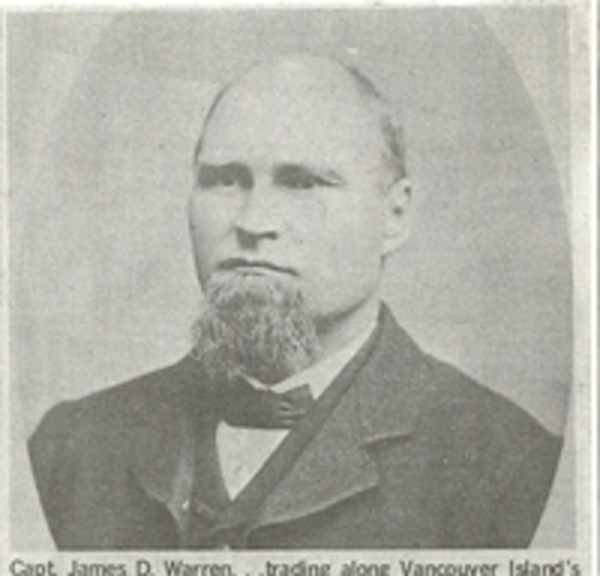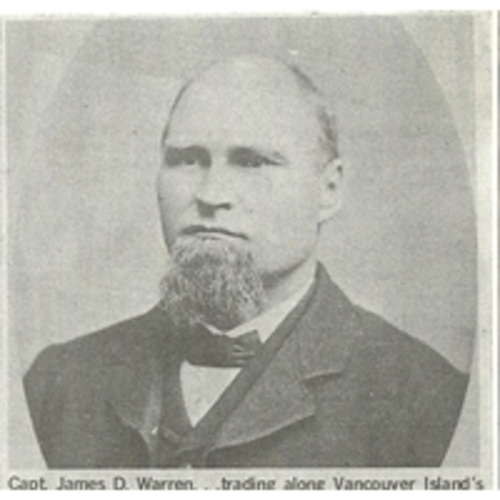
Source: Link
WARREN, JAMES DOUGLAS, trader, freighter, and sealing captain; b. 28 Feb. 1837 in North River, P.E.I., son of George Warren and Grace Pollard; m. before 1868 Hannah Lancashire, and they had two daughters and a son; d. 9 Sept. 1917 in Victoria.
James D. Warren arrived in Victoria in 1858 and started trading with the Indians on the west coast of Vancouver Island in the sloop Thornton. He freighted cargo and occasionally shipped passengers, but his main business was trading dogfish oil and furs, particularly the pelt of the North Pacific fur seal, which was popular in European fashion markets. By 1864 Warren was operating a permanent store at Clayoquot Sound and a regular trade route along the coast of Vancouver Island. He was the first to trade routinely in the waters of northern British Columbia, calling frequently at the major Indian villages on the Nass River and in the remote Queen Charlotte Islands. As he plied the coast, Warren became convinced that more seals could be taken by transporting native hunters directly to the offshore feeding grounds. In 1869 he outfitted the Thornton with a crew of Clayoquot hunters for one of the first commercial pelagic, or open-sea, sealing voyages on the Pacific coast. The venture proved more profitable in experience than in sealskins; Warren managed better returns when he outfitted the Thornton in 1870 and 1871.
Warren was well known for his encounters with the native people during these early years. In 1867 he was convicted of selling liquor to Indians on the Nass. A year later he was hailed in the Victoria press for surviving one of the most sensational clashes on the British Columbia coast. The incident occurred on 13 June 1868, when Warren and his five-man crew were attacked by a group of armed Indians as the Thornton sailed off northern Vancouver Island, in the vicinity of Fort Rupert (near Port Hardy). Warren and the crew returned fire, killing 15 and wounding 5 to end the mêlée. The crew also suffered injuries and Warren himself was hit in the chest by buckshot. Though the newspapers lauded him as a hero, he was arrested for shooting an Indian when he returned to Victoria. The charge was dismissed, but the impression was left that the attack on the Thornton might have been provoked.
In 1871 Warren formed a partnership with Joseph Boscowitz, an American competitor with stores in Clayoquot Sound and Washington state, and purchased the schooner Anna Beck to accompany the Thornton in pelagic sealing. The firm of Warren and Boscowitz also operated several stores in northern and central Vancouver Island, where it traded sealskins with Indians still hunting from their own canoes. Business flourished and by 1881 the firm owned four ships, a third of Victoria’s sealing fleet. That same year Warren introduced steam engines to his vessels so they could navigate the coastal tides more easily. In 1884 he was among the first Victoria sealers to pursue the migrating seals beyond the usual hunting grounds off southern Washington and British Columbia, and into the Bering Sea [see Clarence Nelson Cox*; Alexander MacLean]. The encroachment of these “pelagic poachers” alarmed American land-based sealing interests and prompted seizures by American revenue cutters. In 1886 and 1887 Warren owned full or part interest in seven vessels, more than any other sealer in Victoria, and all but two were apprehended, including the flagship Thornton.
Despite the later judgement that the American action was illegal, Warren was ruined. His relationship with Boscowitz deteriorated rapidly and they formally dissolved their partnership in 1888 amidst bitter and lengthy litigation. In 1889 Warren helped form the Victoria Shippers and Master Sealers Association, an alliance of pelagic sealers formed to seek compensation for the Bering Sea seizures and provide mutual protection and assistance. Warren was its chairman until 1891, when financial problems, including mounting legal debts, forced him to leave sealing altogether.
Warren subsequently became a marine-insurance agent and resumed his original career of freighting; in 1897 he purchased the Alpha, a former Cunard steamer, and started shipping passengers and supplies to the Klondike gold-fields. He added the Barbara Boscowitz the next year and managed to recoup some of his losses. When the gold-rush subsided in 1900, Warren sold his interest in these vessels and retired quietly to his home in Victoria, where he continued to be venerated as one of British Columbia’s pioneer sealers and leading mariners.
BCARS, Add. mss 16; I/BS/Sp8. Daily Colonist (Victoria), 20, 22 June, 4 Sept. 1868; 11 Sept. 1917; 2 Dec. 1955; 31 Dec. 1958; 21 June 1964. Bering Sea Tribunal of Arbitration, Fur seal arbitration; proceedings of the tribunal of arbitration, convened at Paris under the treaty between the United States of America and Great Britain, concluded at Washington, February 29, 1892 . . . (16v. in 12, Washington, 1895). Lewis & Dryden’s marine history of the Pacific northwest; an illustrated review of the growth and development of the maritime industry . . . , ed. E. W. Wright (Portland, Oreg., 1895; repr. Seattle, Wash., 1967), 427. Peter Murray, The vagabond fleet: a chronicle of the North Pacific sealing schooner trade (Victoria, 1988).
Cite This Article
Ira Chaikin, “WARREN, JAMES DOUGLAS,” in Dictionary of Canadian Biography, vol. 14, University of Toronto/Université Laval, 2003–, accessed December 31, 2025, https://www.biographi.ca/en/bio/warren_james_douglas_14E.html.
The citation above shows the format for footnotes and endnotes according to the Chicago manual of style (16th edition). Information to be used in other citation formats:
| Permalink: | https://www.biographi.ca/en/bio/warren_james_douglas_14E.html |
| Author of Article: | Ira Chaikin |
| Title of Article: | WARREN, JAMES DOUGLAS |
| Publication Name: | Dictionary of Canadian Biography, vol. 14 |
| Publisher: | University of Toronto/Université Laval |
| Year of publication: | 1998 |
| Year of revision: | 1998 |
| Access Date: | December 31, 2025 |



